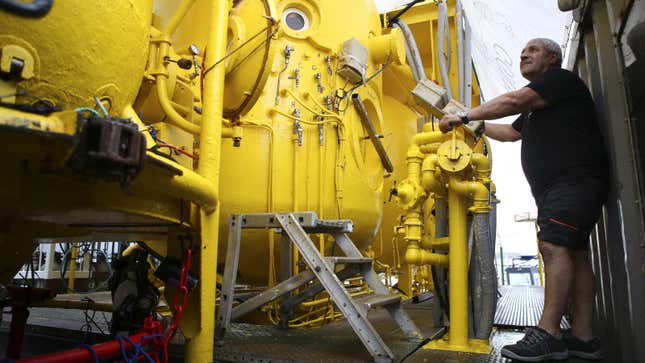
Submarines are pretty cool bits of kit. They can offer researchers an unrivaled view of the ocean floor, help search out missing wrecks beneath the waves and can even ferry about the rich and famous, with mixed results. While all that is very cool, there’s one downside to riding in a deep sea submarine: you might end up sounding pretty silly.
When a submarine dives below the surface, it’s a completely sealed system, with the crew taking down everything they’ll need on their journey to the ocean floor. This includes essential supplies, snacks, any equipment they want and even the air they’ll need to breathe.
When it comes to taking enough air for a trip, crews turn to compressed gasses that can be piped into their cabin as required. Usually, a mix of oxygen and nitrogen is fine as it replicates the kind of air we breathe on the surface. When you go deeper, however, that’s not as safe to use.
Instead, on much longer and deeper journeys to the ocean floor, subs are loaded up with a gas called heliox, which is a blend of helium and oxygen. This mixture is used on saturation diving missions, where crews sink to the ocean floor in specially designed subs for up to 28 days at a time.
During these trips, they live and work inside the craft and also exit the vessel to carry out work on things like oil rigs and underwater cables. When spending so long beneath the waves, the heliox gas gives crews of deep sea submarines a better blood oxygen saturation and means they can remain safe under the water, explained excellent Instagrammer Geo Rutherford in a recent post.
Today, the helium/oxygen blend is used by anyone diving to 190 feet or greater, and its advantages makes deep-sea diving much safer. As well as those pretty important advantages, heliox does bring with it a rather amusing side effect: it makes you sound a bit like a chipmunk.
Because helium is a less dense gas that oxygen, it allows your vocal cords to vibrate much more quickly when you speak, explains the Franklin Institute. As your vocal chords are vibrating quicker, the pitch of your voice rises to comical levels, meaning that everyone on a deep-sea dive comes back to the sub sounding like a cartoon character, as you can see in the video above.
The mix of helium and oxygen has been used by divers on deep-sea projects for years, explained the United States Naval Undersea Museum in a recent blog post. It was developed in the 1930s for the sole purpose of helping scuba divers head deeper into the oceans, as the site explains:
In May 1939, submarine USS Squalus (SS 192) sank in 243 feet of water. The salvage operation provided the first real test of NEDU’s helium-oxygen breathing mixture. After divers experienced disorienting nitrogen narcosis while breathing air, they were switched to helium. Breathing helium eliminated the effects of nitrogen narcosis and allowed the divers to work longer and more efficiently.
Those early tests of heliox did reveal another amusing challenge of using the gas. As well as giving the divers a funny voice, the helium in the mix also made them more buoyant in the water, which had to be compensated for in the mix’s makeup and, in some instances, with additional weights for divers.